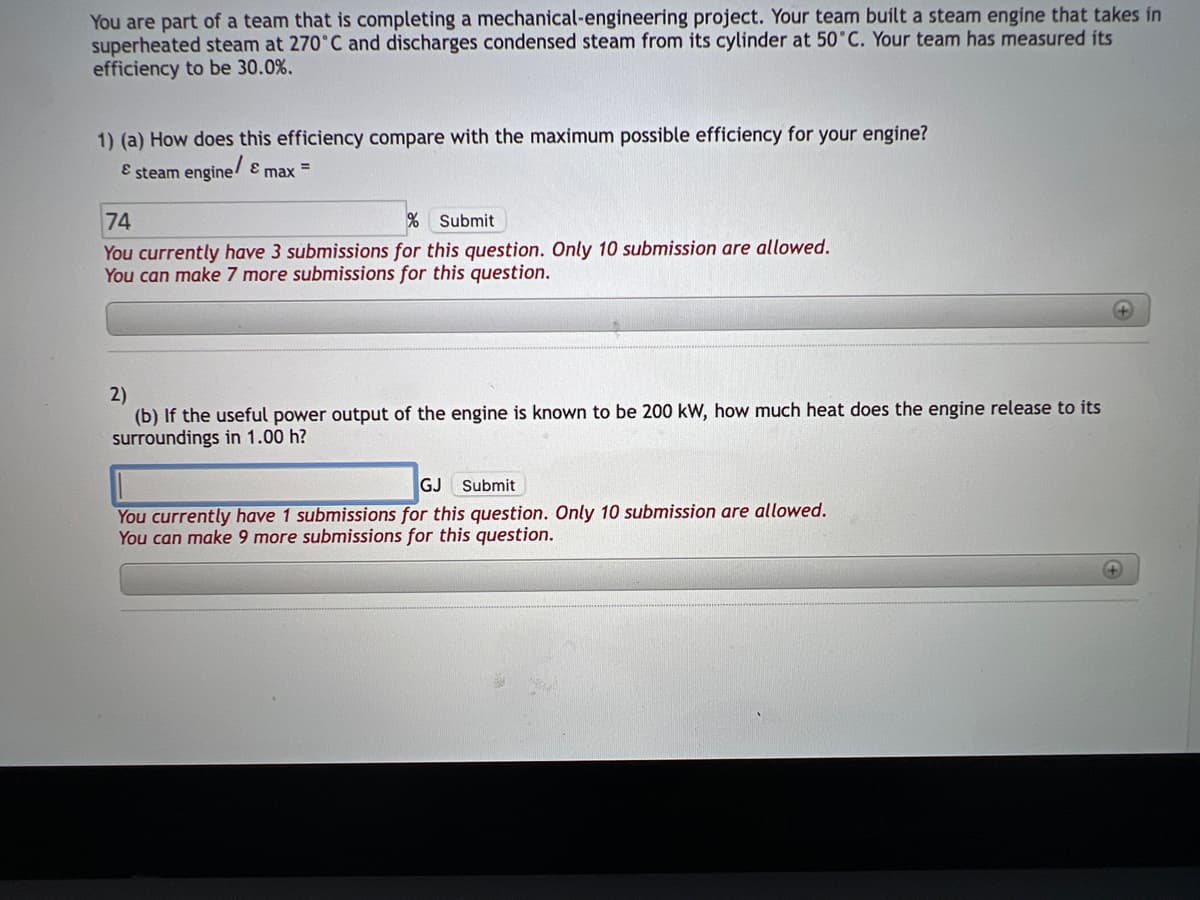You are part of a team that is completing a mechanical-engineering project. Your team built a steam engine that takes in superheated steam at 270°C and discharges condensed steam from its cylinder at 50°C. Your team has measured its efficiency to be 30.0%. 1) (a) How does this efficiency compare with the maximum possible efficiency for your engine? & steam engine/ & max = 74 % Submit You currently have 3 submissions for this question. Only 10 submission are allowed. You can make 7 more submissions for this question. 2) (b) If the useful power output of the engine is known to be 200 kW, how much heat does the engine release to its surroundings in 1.00 h? GJ Submit You currently have 1 submissions for this question. Only 10 submission are allowed. You can make 9 more submissions for this question. +
You are part of a team that is completing a mechanical-engineering project. Your team built a steam engine that takes in superheated steam at 270°C and discharges condensed steam from its cylinder at 50°C. Your team has measured its efficiency to be 30.0%. 1) (a) How does this efficiency compare with the maximum possible efficiency for your engine? & steam engine/ & max = 74 % Submit You currently have 3 submissions for this question. Only 10 submission are allowed. You can make 7 more submissions for this question. 2) (b) If the useful power output of the engine is known to be 200 kW, how much heat does the engine release to its surroundings in 1.00 h? GJ Submit You currently have 1 submissions for this question. Only 10 submission are allowed. You can make 9 more submissions for this question. +
Elements Of Electromagnetics
7th Edition
ISBN:9780190698614
Author:Sadiku, Matthew N. O.
Publisher:Sadiku, Matthew N. O.
ChapterMA: Math Assessment
Section: Chapter Questions
Problem 1.1MA
Related questions
Question
Please explain how part b is broken down and the result

Transcribed Image Text:You are part of a team that is completing a mechanical-engineering project. Your team built a steam engine that takes in
superheated steam at 270°C and discharges condensed steam from its cylinder at 50°C. Your team has measured its
efficiency to be 30.0%.
1) (a) How does this efficiency compare with the maximum possible efficiency for your engine?
& steam engine/ & max =
74
% Submit
You currently have 3 submissions for this question. Only 10 submission are allowed.
You can make 7 more submissions for this question.
2)
(b) If the useful power output of the engine is known to be 200 kW, how much heat does the engine release to its
surroundings in 1.00 h?
GJ Submit
You currently have 1 submissions for this question. Only 10 submission are allowed.
You can make 9 more submissions for this question.
+
Expert Solution
This question has been solved!
Explore an expertly crafted, step-by-step solution for a thorough understanding of key concepts.
Step by step
Solved in 2 steps with 2 images

Knowledge Booster
Learn more about
Need a deep-dive on the concept behind this application? Look no further. Learn more about this topic, mechanical-engineering and related others by exploring similar questions and additional content below.Recommended textbooks for you

Elements Of Electromagnetics
Mechanical Engineering
ISBN:
9780190698614
Author:
Sadiku, Matthew N. O.
Publisher:
Oxford University Press

Mechanics of Materials (10th Edition)
Mechanical Engineering
ISBN:
9780134319650
Author:
Russell C. Hibbeler
Publisher:
PEARSON

Thermodynamics: An Engineering Approach
Mechanical Engineering
ISBN:
9781259822674
Author:
Yunus A. Cengel Dr., Michael A. Boles
Publisher:
McGraw-Hill Education

Elements Of Electromagnetics
Mechanical Engineering
ISBN:
9780190698614
Author:
Sadiku, Matthew N. O.
Publisher:
Oxford University Press

Mechanics of Materials (10th Edition)
Mechanical Engineering
ISBN:
9780134319650
Author:
Russell C. Hibbeler
Publisher:
PEARSON

Thermodynamics: An Engineering Approach
Mechanical Engineering
ISBN:
9781259822674
Author:
Yunus A. Cengel Dr., Michael A. Boles
Publisher:
McGraw-Hill Education

Control Systems Engineering
Mechanical Engineering
ISBN:
9781118170519
Author:
Norman S. Nise
Publisher:
WILEY

Mechanics of Materials (MindTap Course List)
Mechanical Engineering
ISBN:
9781337093347
Author:
Barry J. Goodno, James M. Gere
Publisher:
Cengage Learning

Engineering Mechanics: Statics
Mechanical Engineering
ISBN:
9781118807330
Author:
James L. Meriam, L. G. Kraige, J. N. Bolton
Publisher:
WILEY